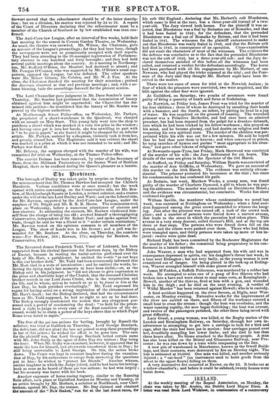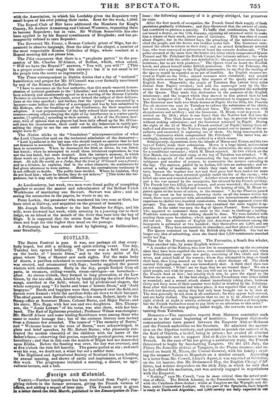IRELAND.
At the weekly meeting of the Repeal Association, on Monday, the chair was taken by Mr. Arabia, the Dublin Lord Mayor Elect. A letter was read how Lord Wicklow, in continuation of a controversy withahe Association, in which his Lordship gives the Repealers,very small hopes of his ever joining their ranks. Rent for the week, 1,396L The Repeal Club of Birr have addressed the Members for King's County, Sir Andrew Armstrong and Colonel Westenra, requesting them to become Repealers ; but in vain. Sir William Somerville has also been applied to by his Repeal constituents of Drogheda; and has peremptorily refused to turn Repealer.
The Reverend Mr. Feeny, a Roman Catholic priest of Sligo, has denounced in abusive language, from the altar of his chapel, a number of the most respectable Roman Catholics of Sligo, whose conduct at a Repeal meeting did not please him.
The Pilot announces that there is a "prophetic parrot" in the possession of Mr. Charles M‘Alister, of Belfast, which, when asked, "Will we have the Repeal ?" answers, "You will, you will !" [This is a proper oracle—one taught his answers : but it is not usual to let the people into the secret so ingenuously.] The Times correspondent in Dublin denies that a day of " national " humiliation and prayer for Mr. O'Connell was ever formally sanctioned by any of the Roman Catholic Prelates " I have to announce on the best authority, that this much-vaunted demonstration of national gratitude to the Liberator,' and which was stated to have been solemnly and unanimously agreed to at a meeting of the Roman Catholic Prelates in conference at Maynooth, never formed the subject of their deliberations at the time specified ; and further, that the ' prayer ' was concocted by a layman—some believe the editor of a newspaper, and was by him submitted to the Bishops, after the breaking-up of the Conference, for their sanction and adoption. A vast preponderance of the body refused their assent ; for several reasons—among others denying the right of lay interference in a matter purely secular, [? spiritual,] according to their notions. A few of the Prelates, however, were of opinion that as prayers had been daily offered up for Mr. O'Connell since his incarceration, there could not be any indecorum in tacitly permitting the clergy to use the one under consideration, on whatever day they might deem fit."
The Nation sticks to the "fraudulent" misrepresentation of what the Lord Chancellor said on the technical admission of the demurrer " Lord Lyndhurst is the last man who should hazard an opinion that he had not firmness to maintain. Whether for good or evil, his greatest enormity has been in recantation. When he denounced the Irish as aliens, he was hated, but feared ; when he attempted to recall those intolerant expressions, he was not the less hated, but more despised. Into the nation's memory, in which those words are yet green, be now flings another ingredient of hatred and distrust. He tells the world, as a Judge, that the trial of O'Connell was a fraud ; and as a debater, he explains, that in the other character the sentiments he had given utterance to were untrue. Between his contradictory testimony it is not difficult to decide. The public have decided. Where he explains, they do not heed him; where he denies, they do not believe." [This looks like impudence, but it may only be absurd silliness.]



























 Previous page
Previous page